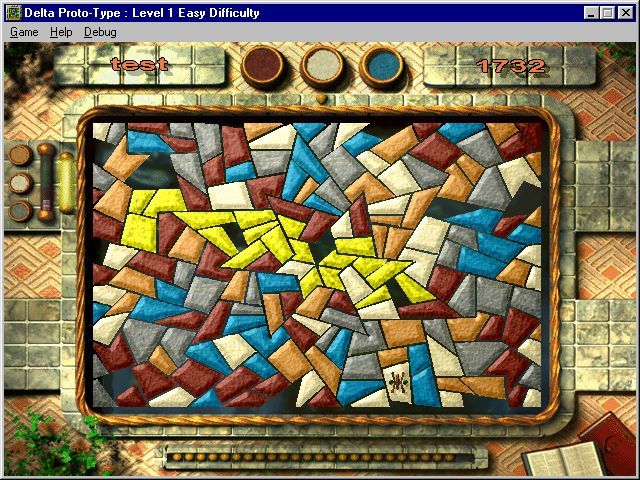Retro Replay Review
Gameplay
Fathom: The Game of Tiles offers a deeply strategic experience built around a simple yet rich mechanic of selecting colored tiles. Each tile comes in one of four colors, and mastering the interplay between them is crucial for both offense and defense. Players must carefully consider when to expand their frontier, crystallize for shelter, or unleash runes to gain powerful advantages on the board.
(HEY YOU!! We hope you enjoy! We try not to run ads. So basically, this is a very expensive hobby running this site. Please consider joining us for updates, forums, and more. Network w/ us to make some cash or friends while retro gaming, and you can win some free retro games for posting. Okay, carry on 👍)
The game features two distinct modes: single-player solitaire and multi-player battle. In solitaire, you face off against a variety of AI opponents with escalating difficulty, each employing unique tile-placement strategies. This mode is ideal for newcomers looking to learn the ropes or veterans seeking to refine their tactical approach in a low-pressure environment.
In multi-player battle mode, up to four players can compete on the same Atlantean-themed board, making for a tense and dynamic experience. Alliances can form and crumble in an instant, and the runoff for territory control becomes a thrilling test of both foresight and adaptability. Local and online play options ensure you can challenge friends or find worthy opponents from around the world.
Beyond the core modes, Fathom introduces runes—special power-up tiles that can turn the tide of any match when used strategically. Deciding whether to commit to a heavy offensive push, build up your defenses with crystalline walls, or hold onto runes for a climactic play adds layers of depth that keep each match feeling fresh and unpredictable.
Graphics
Fathom’s visual design is a standout feature, blending clean tile art with the mystique of a sunken Atlantean city risen near Miami. The board itself is set against a backdrop of coral structures and submerged ruins, giving every match an atmospheric flair that elevates routine tile placement into an immersive ritual.
The tiles are color-coded with vibrant hues that pop against the deeper blues and greens of the sea-themed environment. Animations for offensive frontiers unfurl like crashing waves, while crystalline defenses shimmer with prismatic light—small touches that make each move feel satisfying and weighty.
User interface elements are neatly integrated around the game board, displaying runes, available tiles, and turn timers without cluttering the screen. Menus fade in and out smoothly, and sound effects—such as the echoing drip of water and the resonant chime of rune activation—further cement the game’s undersea ambiance.
Particle effects during critical moments, like conquering a large swath of tiles or triggering a rune, add cinematic panache without overwhelming performance. Even on modest hardware, Fathom maintains a steady frame rate, ensuring that the graphical spectacle remains consistently polished from start to finish.
Story
The narrative premise of Fathom is both intriguing and straightforward: after an Atlantean city emerges from the deep blue sea near Miami, researchers discover an ancient pool filled with enigmatic tiles. As a volunteer in this scientific study, you take on the mantle of “Fathom,” a contender vying for mastery over the city’s lost playfield.
Though the story unfolds primarily through brief cutscenes and in-game lore entries, it effectively frames every match as a high-stakes experiment. Scientists observe your moves, annotate your tactics, and speculate on the hidden rules that govern the Atlantean artifacts. This meta-layer of observation adds an intellectual thrill to each victory or defeat.
Characterization is subtle but memorable: fellow players and AI opponents—labeled as veteran researchers, naval officers, or ambitious students—offer snippets of dialogue that hint at their own motivations. Whether they seek fame, fortune, or a deeper understanding of Atlantis, their personalities color the competitive atmosphere without overshadowing the core tile mechanics.
The story’s pacing mirrors the gameplay: begins as a curious experiment, escalates into a fierce contest for dominion, and ultimately leaves you pondering the true purpose of the Atlantean tiles. By the time you’ve conquered—or been conquered—a dozen times, you’ll feel a genuine connection to the rising city and the mystery it presents.
Overall Experience
Fathom: The Game of Tiles strikes an impressive balance between accessibility and depth. New players can quickly grasp the four-color system and basic offensive/defensive plays, while seasoned strategists will delight in exploring advanced rune combinations and long-term board control tactics.
The dual-mode structure ensures that solo enthusiasts have plenty of content to chew on, with AI challenges that grow more cunning over time. Meanwhile, the multi-player arena provides endless replayability and social drama—friends will scheme behind your back, forge alliances, and then betray you in the span of a single match.
Sound design, art direction, and the Atlantean setting coalesce to create an atmosphere that’s both mystical and competitive. Every conquest feels like reclaiming a fragment of lost civilization, and each defeat stings just enough to drive you back for another round.
For fans of tile-based strategy and anyone intrigued by a modern spin on classic board-game mechanics, Fathom delivers a compelling package. It’s easy to pick up, hard to master, and consistently rewarding, making it a must-try title for puzzle solvers, competitive gamers, and anyone looking to dive into the depths of Atlantean legend.
 Retro Replay Retro Replay gaming reviews, news, emulation, geek stuff and more!
Retro Replay Retro Replay gaming reviews, news, emulation, geek stuff and more!




Reviews
There are no reviews yet.